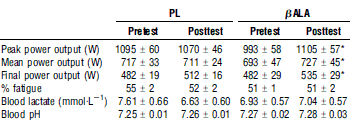|
Definition: "An ergogenic aid is any substance or phenomenon that enhances performance "
|
|
||||||||
29.03.2009 |
|
|
Beta-alanine for a faster final sprint
Beta-alanine is a precursor of the dipeptide carnosine [structural formula shown below], which works as a buffer in the muscle cells. When high-intensity exercise induces the muscle cells to produce large amounts of hydrogen, carnosine neutralises the hydrogen that otherwise inhibits metabolism when concentrations get too high. As a result, the muscles are capable of performing at a high-level for longer. Researchers estimate that carnosine is responsible for ten percent of the buffering capacity of the muscle cells.
While carnosine is too expensive for athletes, its precursor beta-alanine is not. In experiments where test subjects took four grams a day of beta-alanine for eight weeks, the concentration of carnosine in the muscle cells rose by more than fifty percent.

Athletes that have used beta-alanine supplements successfully compare its effect with that of creatine. But creatine and beta-alanine work in different ways. That's why the researchers suspect that the two supplements may complement each other synergistically. Studies where athletes took both creatine and beta-alanine seem to indicate the same – the combination resulted in more power progression than with creatine alone. [Int J Sport Nutr Exerc Metab. 2006 Aug;16(4):430-46.] Studies in which strength athletes took only beta-alanine have resulted in little progress so far. [Amino Acids. 2008 May;34(4):547-54.]
The Belgians wondered whether beta-alanine can help cyclists to get a faster final sprint at the end of a race. The end sprint is important as it is often when the race is decided.
The researchers gave eighteen experienced cyclists increasing doses of beta-alanine or a placebo for a period of eight weeks. They started with two grams a day, and built the dose up over a four-week period to four grams a day. Before and after the trial period the researchers got the test subjects to cycle 110 minutes at a reasonable level, then they got them to do ten minutes of timed riding at maximum level and ended up with a thirty-second sprint. It was during the sprint that the effect of the supplement became clear.
The athletes did this all on a stationary bike. The athletes had to give as much power as they could. The figures below show the mean power and the peak power of the test subjects.
The peak power increased by eleven percent as a result of the supplement. The mean power decreased by five percent. The table below provides more data on the effect of beta-alanine during the sprint.
The researchers suspect that the increase in power should mean faster final sprints. Beta-alanine might therefore be an interesting product for endurance athletes, they reason. Not only because it seems to work as well as creatine, but also because beta-alanine - unlike creatine - does not lead to an increase in weight. At least, not in their study. And the lighter endurance athletes are, the better.
A side effect of beta-alanine is that users get an itchy sensation in their skin. The athletes in this study did not report this happening. This may be, the researchers suggest, because they built up the dose gradually.
Source:
|
|



